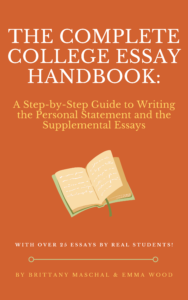One of the reasons that we like students to have a sense of their college list when they start essay writing is that each essay does not exist in a vacuum. Everything submitted with a college application needs to work together to tell the fullest story possible about who you are, what you are all about, and the value you will add to the school that’s reading your application.
Complement your Personal Statement—don’t compete with it. You should aim to make sure all of your supplemental essays are as separate from the personal statement as possible. For instance, if my personal statement is about my passion for dance (my main extracurricular), and a school requires what we call a creativity supplement in The Complete College Essay Handbook, I would choose to write about something other than dance for the PS because I might want to focus on that in the supplement.
Present a rounded picture, even if you are narrow. Notice that I didn’t say be well-rounded. I don’t advise that! But imagine you apply to a school that requires two supplemental essays. One prompt clearly calls for an academic and intellectual interests (AII) essay, and the second is open-ended. You wouldn’t want to write a second AII essay for that school. Although college is first and foremost about academics, you want the opportunity to present as many parts of yourself as possible; go with any one of the other three types of supplemental essays that we outline in detail within The Complete College Essay Handbook! Every single college applicant should be able to write an impact and influence and community and identity essay.
Consider the school’s values. Sticking with the same example: if a school asks for two supplements and one prompt clearly calls for an AII essay, and the second is open-ended, in addition to writing a different type of supp, you should also take the school’s mission and values into consideration. For instance, since Jesuit schools like Santa Clara, Fordham, and the University of San Francisco tend to value service more than some secular schools, an impact and influence essay would be the best choice for the second prompt. Conversely, a liberal arts college with a long history of political activism, such as Wesleyan, Smith, or Oberlin, might react more favorably to a community and identity essay with an impact twist.
Use your best story. Imagine you have one just incredible story, and it fits perfectly into the impact and influence type. You write the essay—it’s great, and you love it! Then you realize that your top-choice school asks for a community and identity essay. What should you do? If your story is really that good, you are actually better off turning that impact and influence essay into a community and identity essay—even if it feels like a bit of a stretch. Admissions officers will remember how you made them feel—not that you didn’t answer the question quite as accurately as another applicant.
*Stay in the know! Subscribe*










